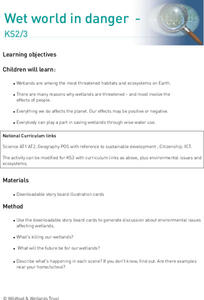Curated OER
The Fish Trade
High schoolers read and discuss a document regarding how the global fish trade is important to humans all over the world. Students conduct Internet research and write a scenario about what would happen if other countries did not help...
Curated OER
New Ship For the Old World
Learners explore the age of sailing in the colonies through role-playing. In groups, they play the role of a business owner, shipbuilder and geographer to complete specific tasks. They participate in an old World trade show to...
Curated OER
Altered Genes
Learners describe the economic relationship between farmers, consumers, and food companies. They examine the issues regarding the reactions of consumers in this country and other countries to the use of gene-altered crops in food...
Curated OER
Environment or Economy?
Students develop counterarguments to John Mizzoni's article on business sustainability. In this economics vs. environment lesson, students present examples of greenwashing and support them with rationale. They also discuss whether carbon...
Curated OER
Science of War
Tenth graders, from an environmental perspective, study the pros and cons of war. Distinctions between characteristics of biological, chemical and nuclear threats and the impact of economic development are considered.
Curated OER
German Energy Conversations
Students identify and interpret the current German energy mix and trends, as well as to make comparisons and contrasts to that of their own country. They write a two paragraph description of including its likely position in the future...
Curated OER
The High Cost of Chemical Dependency
Sixth graders explore, analyze and study the effect and impact that humans have on the environment based on their choices as individuals, businesses and governments. They assess the balance between human activities and aquatic pollution.
Curated OER
Industrial Agriculture
Students write about the benefits that industrial agriculture has had on growing crops. In this industrial agriculture lesson plan, students research how technology has impacted the processing speed of growing food.
Curated OER
Alien Invasion
Students research how alien species can change an ecosystem. In this coral reef instructional activity, students describe invasive species and site evidence how these species came to be invasive and what control measures are possible.
Curated OER
How Many Types of Rice Are There?
Sixth graders investigate the cultivation and variation of rice around the world. In this food lesson, 6th graders read about the process of bringing rice from a farm to your dinner plate and which types of rice grow in which locations....
Curated OER
Wet World in Danger
Students investigate the reasons why wetlands are threatened especially by people. They study the wise use of water to preserve wetlands.
Curated OER
Where's King Solomon when we need him?: Good decisions on resources
Students use geographic information to suggest how to manage natural resources through a simulation. They engage in a simulation, and decide how to protect, allocate, and exploit the resources of a hypothetical location.
Curated OER
A Sense of West Virginia
Students consider their perceptions of the world through their 5 senses while visiting the West Virginia State Museum. In this West Virginia history lesson, students discover how knowing about the past helps with their understanding of...
Curated OER
A Common Thread
Sixth graders explore the Renaissance. In this Renaissance lesson, 6th graders study the culture and society of the middle ages. Students research the geography and climate of the times and discover how these affected agriculture.
















